Text
“Everything you say should be true, but not everything true should be said.”
— Voltaire
1K notes
·
View notes
Text
25 of 250 Favorite Fiction - And Then There Were None
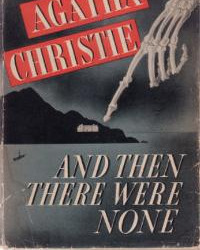
Author: Agatha Christie
Date of Publication: 1939
Country: United Kingdom
Ten strangers arrive on an island. They dine and bristle at each other’s company, unsure of why they are here. A record played after dinner accuses all ten of them of being responsible for someone’s death. All but one denies the charges. Another sips a drink and promptly falls dead. After some investigation and deliberation, the elderly Judge Wargrave pronounces: “One of us in this very room is in fact the murderer.” Thus begins one of the best selling novels of all time.
Agatha Christie is at times considered light reading, her stories pigeon holded as elaborate, cozy mouse traps that are (despite their subject) bloodless. Christie did write her fair share of mundane puzzles devoid of characterization and thematic heft; however, her best work hides an ocean of darkness in which characters often drown and the ending, while providing justice, does not offer sunshine.
And Then There Were None is definitively the latter. There are no heroes in this story, no good people. While the poem at the heart of mystery is an elegant and devious guide and the key to Christie’s genius plotting, it also “others” the characters. By the nature of their crimes, they have violated society’s rules and thus stand apart - symbolized by the ten figurines on the dining room table. As those figurines disappear with each death, the novel builds to a frightening and twisted crescendo in which the karmic debt these “others” have incurred is repaid in ways that have thrilled for 85 years.
0 notes
Text
“The hall is rented, the orchestra engaged, now it’s time to see if you can dance…”
— Q to Picard
5 notes
·
View notes
Text
25 of 250 Favorite Fiction - Ender’s Game

Author: Orson Scott Card
Date of Publication: 1985
Country: United States
There are two quotes that best summarize Orson Scott Card’s signature novel (one of the few to simultaneously win the Hugo and Nebula awards for Novel of the Year) and encapsulate the themes found throughout his work.
Ender Wiggin, all of six years old, has been drafted to fight in a war against an alien race known as “the buggers”. To say that he goes through trials meant to hammer and mold his raw military talent is an understatement. As one might expect from a child, he wonders about his own happiness. However, greatness does not behoove happiness. According to Ender’s mentor, Mazor Rackham, “Humanity does not ask us to be happy. It merely asks us to be brilliant on its behalf.” Much of the novel’s tension comes from Ender’s teachers asking for more from him and Ender determining how much he’s willing to give.
In order for Ender to win his “game”, he must do something that at once seems counterintuitive to a soldier in the face of the enemy. Using an impeccable line of logic, Ender realizes “In the moment when I truly understand my enemy, understand him well enough to defeat him, then in that very moment I also love him.” To his horror he realizes that this terrible intimacy is what allows him to destroy his enemy via an iconic twist. The ending of the novel explores the consequences of this with sensitivity and wisdom, understanding the weight of this love and the destruction it wrought.
1 note
·
View note
Text
“You were unsure which pain is worse - the shock of what happened or the ache for what never will.”
— Simon Van Booy
688 notes
·
View notes
Text
25 of 250: Favorite Fiction - World War Z

Author: Max Brooks
Date of Publication: 2006
Country: United States
The beauty of horror is that it explores how people and societies react in times of extreme stress, times that reveal character and few stories predicted the failure of many governments’ response to the Covid pandemic than Max Brooks’s debut novel. Taking inspiration from the form of Studs Terkel’s The Good War, Brooks tells the story of the zombie apocalypse through the people who survived it, starting from the plague’s emergence to humanity’s pyrrhic victory.
By going broad, Brooks pulls off something very difficult - conveying the full scope of a global catastrophe. He does this by focusing each chapter on one specific, niche thing about what living through such a disaster would be like, whether it's crafting weapons, trying to survive in adverse conditions, or the (hauntingly) the effect it had on children who were forced to fend for themselves.
The first third of the book is the most infuriating, especially in light of the last four years. Brooks effectively points the finger at ossified systems and ways of thinking. The fact that the world is so interconnected, yet jealously nationalist is the key to the rapidity and scale of the destruction. Brooks does not sugar coat the bureaucratic failures that killed billions of people, and the heartbreak comes from the point of view of people who know better, aren’t short sighted, or cynical enough to recognize the failure that’s coming. Back in 2006, this novel felt like an exercise in hypotheticals; in 2024 it’s a terrifying, precinct historical document.
0 notes
Text
“The saddest truth is realising you have fallen madly in love with what can never be.”
— Michael Faudet
1K notes
·
View notes
Text
25 of 250 Favorite Fiction -The Lone Ranger and Tonto Fist Fight in Heaven

Author: Sherman Alexie
Date of Publication: 1993
Country: United States
The only collection of short stories on this list, Sherman Alexie started out as a poet before shifting into prose. Poets often excel at inference and imagery, which coincidentally are some of Alexie’s strengths. Look no further than “Crazy Horse Dreams” in which one of Alexie’s recurring characters Victor fails to live up to a woman’s ideal of a Native American. The irony (another of Alexie’s strengths) of course is that Victor often thinks of himself as the perfect stoic Native American, he cannot live up to her expectations. Although it is specific to this culture, many people can relate to not living up to someone’s idea of you.
Many of Alexie’s stories involve two characters - Victor Joseph and Thomas Builds-the-Fire, two very different characters with very different ideas about how to honor their culture. As mentioned, Victor prefers to follow what he believes to be a warrior ethos. Thomas chooses to tell stories - a lot. Stories that don’t make sense, that seem totally disconnected from reality (example: “The Trial of Thomas Builds-the-Fire”). That these two different people can connect in a meaningful way is explored in the sublime “This is What It Means to Say Phoenix, Arizona” where Victor and Thomas go on a road trip to settle Victor’s father’s estate. During a pivotal scene, Alexie has these two characters admit their connection in a beautifully understated manner. It’s true to Victor’s character and shows how well Alexie ensures his audience doesn’t miss his point without belaboring the point.
#25 of 250#favorite fiction#book review#the lone ranger and tonto fistfight in heaven#sherman alexie
0 notes
Text
The Top Ten Books I Read in 2023
Beginning Educator: Navigating a Second Year in Teaching - Tim Clark
Written by my favorite teacher from high school and published posthumously, this collection of newspaper columns is balm to an educator’s soul. With wit and economy, Clark captures the tempest of emotions teachers go through on a daily or (sometimes) a class by class basis. Never before had I run into a book that captures what life as an educator is really like.
This Other Eden - Paul Harding
Harding’s debut novel Tinkers is a top ten book for me - lyrical, elegant, and unapologetically New England. Harding’s third book is more of the same, only with melancholy tinged with rage. Based on a shameful chapter in Maine’s history, Harding’s story breaths life into a community on the periphery and gives it back its dignity.
Before the Coffee Gets Cold - Toshikazu Kawaguchi
Somewhere in Japan there’s a cafe where you can travel into the past. However, there are rules. Lots of rules. Originally written as a play (and it reads like one), this novel has an irresistible premise that drives a beautifully character driven plot that slowly builds to an aching, moving crescendo that overcomes the flaws in its craft. I haven’t been able to stop think about it for weeks.
Writers & Lovers - Lily King
Set in a specific time (the 90s) and a very specific place (Cambridge, Mass.), King’s story captures a woman at a crossroads and in crisis - some of her own making, some not. At times I felt seen while reading this. The rest of the time I was enthralled with King’s empathetic, conversational style.
Station Eleven - Emily St. John Mandel
In the words of Bill Adama of Battlestar Galactica, "it’s not just enough to survive, one must be worthy or survival.” In a world where over 90% of the population perishes in a flu epidemic, a traveling troupe of actors goes from town to town putting on Shakespeare for the shattered remnants of civilization - refusing to let the light of art die out. There’s more to the story, of course - one that Mandel writes with grace and impressive depth; it’s a rare post-apochalytic novel that offers a glimmer of hope because people chose hope.
Moon of the Crusted Snow - Waubgeshig Rice
What would happen if the electricity suddenly went out for good? We’ve seen that story before. What we haven’t seen before is that story from a Native American perspective. A story about the clash of individualism and communalism and of resiliency and reclamation, Rice has a gift of brining a new lens to a familiar situation. I cannot wait to read the sequel when it comes to the U.S.
We Took to the Woods - Louise Dickinson Rich
A Maine classic that can be found in many a cabin, this autobiography of a sort presents a side of Maine few people outside of the state know. This chronicle of life deep in the Maine woods with her husband and infant son struck a chord with me because of my own family history. The attitudes, ethos, and worldview had me nodding as I read - hearing a world that was at once distant and achingly close whisper in my ear.
We Need to Talk About Kevin - Lionel Shriver
Simply the most disturbing book I’ve red in years. Shriver excels at creating a sense of foreboding. You see the train wreck coming and at certain points I almost screamed in frustration for someone to do something. No one in this story is an angel, which only makes things worse. Even now, as I write this, I feel the creepiness tingling in my skin.
Aftermath: The Remnant of War - Donovan Webster
Who cleans up the battlefield after the battle is over? Webster travels the world to find this out. His opening chapter where he helps dig up artillery shells from the battlefields of the First World War, a harvest of iron almost a century old that has no end in sight. It doesn’t get any easier from there and it’s as good an argument as any that the destructiveness of war cannot be contained.
The World Without Us - Alan Weisman
How long would it take for what we’ve built to disappear if we suddenly did? If Thanos did his snap twice and we all were gone, how long would our house last? Our bridges? Our monuments? This is a very meditative book is at once depressing and oddly hopeful. I didn’t finish the book with a sense of dread but rather a sense of appreciation for what we’ve built and the knowledge that everything is reversible given time.
0 notes
Photo
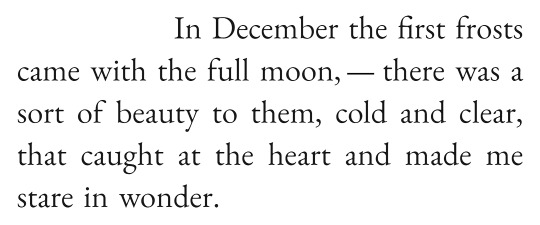
Daphne du Maurier, from “My Cousin Rachel”
3K notes
·
View notes
Text
25 of 250: Favorite Films - Zulu
Not long ago, work colleagues and I got into a discussion about what our favorite films were. Given my categorical nature I could not resist writing down a list and, as a writing challenge, have decided to write 250 word reviews of my favorite 25 films of all-time. Note: these are my favorite films, not what I think are the best films of all time.
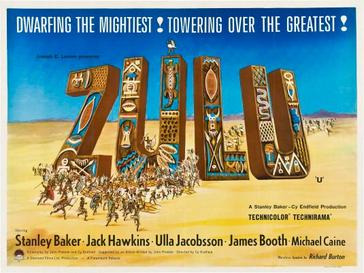
Directed by: Cy Enfield
Written by: John Prebble and Cy Enfield
Starring: Stanley Baker, Michael Caine, Jack Hawkins, James Booth
Year/Country: 1964, United Kingdom
Is the British classic Zulu racist or anti-imperialist? The film has vociferous defenders and critics, each having good ammunition for their arguments. The subject of the film is the Battle of Rorke’s Drift during the Anglo-Zulu War in which 100 British soldiers managed to survive determined attacks by 4,000 Zulu warriors. It still holds the title for the most Victoria Crosses awarded in a single battle.
For those who claim the film is racist, it’s impossible to ignore that the Anglo-Zulu was fought for racist and nakedly imperialist reasons, the battle features African warriors armed with spears against Europeans wielding breech-loading rifles, and the film starts with the exploitive scene of a Zulu wedding ceremony. These are all valid critiques and impossible to ignore. And we shouldn’t. The Anglo-Zulu War led to a century of apartheid in South Africa, just as other colonial adventures did.
However, the arguments claiming the film is anti-imperialist are just as valid. The soldiers are all professionals who view the Zulus as dangerous and worthy opponents; they are unmotivated by patriotism. When one private asks a grizzled veteran “why us?”, the sargeant deadpans “because we’re here, lad.” The nihilism of the troops undercuts any rah-rah moments, resulting in a much more human story than might’ve otherwise been told. At the end of the battle, one officer asks, “So, you’ve fought your first battle. How do you feel?” The answer: “Sick.” Such moments go a long way to minimizing the film’s more troubling attributes.
4 notes
·
View notes
Text
“We cannot truly understand each other. But we can be understanding of one another.”
— Stacie Martin
485 notes
·
View notes
Text
25 of 250: Favorite Films - Witness
Not long ago, work colleagues and I got into a discussion about what our favorite films were. Given my categorical nature I could not resist writing down a list and, as a writing challenge, have decided to write 250 word reviews of my favorite 25 films of all-time. Note: these are my favorite films, not what I think are the best films of all time.

Directed by: Peter Weir
Written by: Earl W. Wallace and William Kelley
Starring: Harrison Ford, Kelly McGillis, Lukas Haas
Year/Country: 1985, United States
In an interview with the American Film Institute, Harrison Ford said, “the worst thing you can do (with a love story) is make love because it spoils the tension.” This was in reference to Australian director Peter Weir’s Witness, one of cinema’s great star-crossed love stories. Ford plays Detective Book, a Philadelphia cop who is shot by a crooked member of his department while investigating the murder of an undercover cop. The only witness to the crime is a visiting Amish boy, accompanied by his mother. Wounded, he takes the boy and his mother back to Pennsylvania’s Amish country where he’s forced to hide out.
From there the movie becomes something truly special - a beautifully shot and scored, thoughtful, honest examination of different cultures, their limitations, and how those living within those cultures are both empowered and constrained by them. Ford turns in the best performance of his career (netting his only Oscar nominatio). His Detective Book is a vulnerable man, out of place in the Amish world. The openness with which he approaches his situation leads to the tender romance with Kelly McGillis’s Rachel. Both are clearly attracted to each other but the tremendous gulf between their cultures prevents them from consummating their attraction. The film is mature enough to realize this (Book: “If we'd made love last night I'd have to stay. Or you'd have to leave.”) and it elevates the film’s power and informs its Hitchcockian finale, one filled with notable restraint and highlights the film’s themes.
2 notes
·
View notes
Text
These hands that are yours. They ache
To dig into your flesh
And open each blue vein
To hear your murmuring blood.
Federico García Lorca, from "Blood Wedding", Three Plays: Blood Wedding. Yerma, The Hous of Bernarda Alba (tr. Michael Dewell & Carmen Zapata)
717 notes
·
View notes
Text
25 of 250: Favorite Films - The Witch
Not long ago, work colleagues and I got into a discussion about what our favorite films were. Given my categorical nature I could not resist writing down a list and, as a writing challenge, have decided to write 250 word reviews of my favorite 25 films of all-time. Note: these are my favorite films, not what I think are the best films of all time.
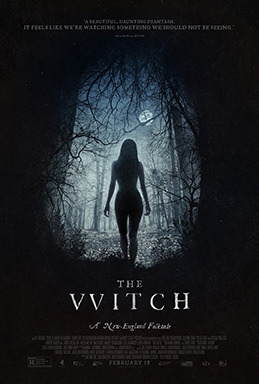
Directed by: Robert Eggers
Written by: Robert Eggers
Starring: Anya Taylor-Joy, Ralph Ineson, Kate Dickie
Year/Country: 2015, United States
The addendum to the title to The Witch is “A New England Folktale”. Indeed, perhaps only those who have grown up in New England can truly understand the Puritan ethos that inspired them to cross the ocean in order to create John Winthrop’s “city upon a hill”. The same can be said of the many subliminal fears the director Robert Eggers exploits in his masterful debut. Following one especially devout family that strikes out on their own, the plot hurtles forward quickly when Thomasin’s (Taylor-Joy) baby brother is kidnapped by a witch. This triggers a crisis within the family; misfortune piles upon misfortune and you watch Thomasin’s family unravel before your eyes.
But why do they unravel? Eggers gives his audience plenty to chew on. On the surface level, it’s fun to watch the supernatural elements toy with these characters. And yet the layers (the layers!). Is all this happening because of the father’s religious hubris? Is this happening in response to repressed sexuality in response to Thomasin going through puberty? Is the witch a symbol of the continent itself, fighting back against the colonists? The fact that you could answer yes to all of these questions shows the depth of this film and why it sticks with the viewer long after its conclusion. Eggers has gone on to create two more eccentric, meticulous movies (thus far), but neither have matched The Witch’s scope. Like all great folktales, the meaning of the film is in the eye of the beholder.
1 note
·
View note
Text
My work is very minor. It will never be noticed by the world at large. But this does not excuse me from the responsibilities of any artist.
— Helen Garner, One Day I'll Remember This: Diaries 1987–1995 (Text Publishing Company, October 12, 2021)
477 notes
·
View notes
Text
My Quirky Taste In Music: Stop Making Sense - Talking Heads
Year Released: 1984 (Expanded Soundtrack Released in 1999)
Country: United States
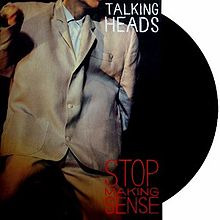
This is not a review of the landmark concert film by Jonathan Demme (that will come later) but of the soundtrack released to accompany it. In particular, I am reviewing the expanded release which came out in 1999. The original soundtrack was a highlight reel of Talking Heads most well-known songs. The expanded version captures the band as the film did – at its creative height, firing on all cylinders. I always found Talking Heads studio recordings (with a few exceptions) cold and painfully artful. The studio tricks the band employed made it feel like the band was holding its audience at a distance, wanting you to look rather than feel. In concert that coldness is nowhere to be seen. The band’s unique blend of skittering punk, irresistible funk, and dada art sensibility explode into joyous life with infectious energy and intelligence. With the exception of “Life During Wartime”, all the songs are better and smoother than their studio versions. “Slippery People”, “Burning Down the House”, and “Girlfriend is Better” all make you want to dance. The centerpiece is the transformative “Once in a Lifetime”. Its studio version is herky jerky and quirky; here it assumes the tone of an elegiac epic, the addition of synthesizers broadening its scope and capturing the contradictory themes of hope and loss the lyrics invoke.
Key Tracks: “Once in a Lifetime”, “Burning Down the House”, “Slippery People”
1 note
·
View note